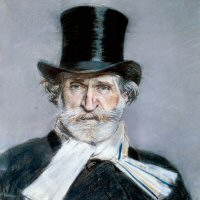In first half of his career, Verdi was forced to alter the settings of politically sensitive subjects to get them past the censors. The womanizing tenor in Rigoletto (1851) that we now know as the Duke of Mantua was originally François I of France. King Gustavus of Sweden, whose assassination is the subject of Un ballo in maschera (A Masked Ball, 1859), became Riccardo, the Governor of colonial Boston. But when setting a French adaptation of Schiller's play Don Carlos in 1867, he was able to remain relatively true both to the original and to history. The action is set against the background of the quest for independence in the Spanish Netherlands; an auto-da-fé of the Spanish Inquisition is displayed onstage; and King Philip II is shown in private anguish, musing on kingship and mortality.
 |
Giuseppe Verdi, 1813–1901. Italian composer.
The composer of 27 operas from Oberto (1835) through Falstaff (1893), Verdi became the premier
opera composer in Italy and, with his exact contemporary but very differently-thinking Richard Wagner, in the world.
His reputation rests mainly on the astonishing trio of operas that launched his middle period—Rigoletto
(1851), Il Trovatore, and La Traviata (both 1853)—and by his three final works: Aida (1871),
Otello (1887), and Falstaff (1893).
|
YouTube, alas, has only a couple of clips from the productions shown in class. For Ballo, I have substituted a
modern production from Leipzig; it lacks glamor, but is a crisp video and has titles. For Don Carlo, I have
turned to the one production I can find with English titles, from the vast open-air stage at Orange in 1984; it has a
great cast, but shows its age. Both productions are complete, though, so you can watch more than just these scenes.
Asterisks, as always, refer to videos not shown in class. rb.
| OPERA SELECTIONS |
| |
Rigoletto (1851) |
|
* Aria, "La donna è mobile"
(Piotr Beczala, Met 2013)
|
| |
Un ballo in maschera (1858) |
|
* Opening chorus
(all Leipzig 2006)
* Act II finale
* Act III, oath scene
* Act III, assassination
|
| |
Don Carlo (1866) |
|
* Act II, Posa & Carlos
(Met 2010)
* Act III, Posa & the King
(Orange 1984)
* Act III, auto-da-fé
(Orange 1984)
* Act IV, King's aria
(Met 2010; not played in class)
* Act IV, Grand Inquisitor scene
(Orange 1984)
* Act IV, death of Posa
(Orange 1984)
|
 |
Giuseppe Verdi, 1813–1901. Italian composer.
The composer of 27 operas from Oberto (1835) through Falstaff (1893), Verdi became the premier
opera composer in Italy and, with his exact contemporary but very differently-thinking Richard Wagner, in the world.
His reputation rests mainly on the astonishing trio of operas that launched his middle period—Rigoletto
(1851), Il Trovatore, and La Traviata (both 1853)—and by his three final works: Aida (1871),
Otello (1887), and Falstaff (1893).
|
| |
|
|
|
|
|
| IMAGES |
The thumbnails below cover the slides shown in class. Click the
thumbnail to see a larger image.
Click on the right or left of this picture to go forward or back,
or outside the border to close. |
 | |
 | |
 | |
 | |
 | |
 | |
 | |
 | |
 | |
 | |
 | |
 | |
• Return to index













